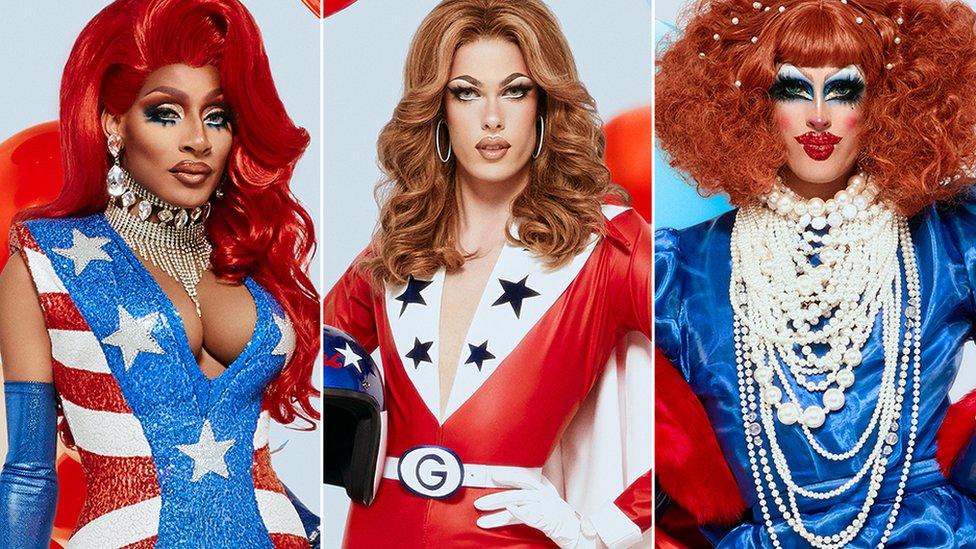Drag Race UK: 'I came out to my mum as non-binary watching the show'
- Published
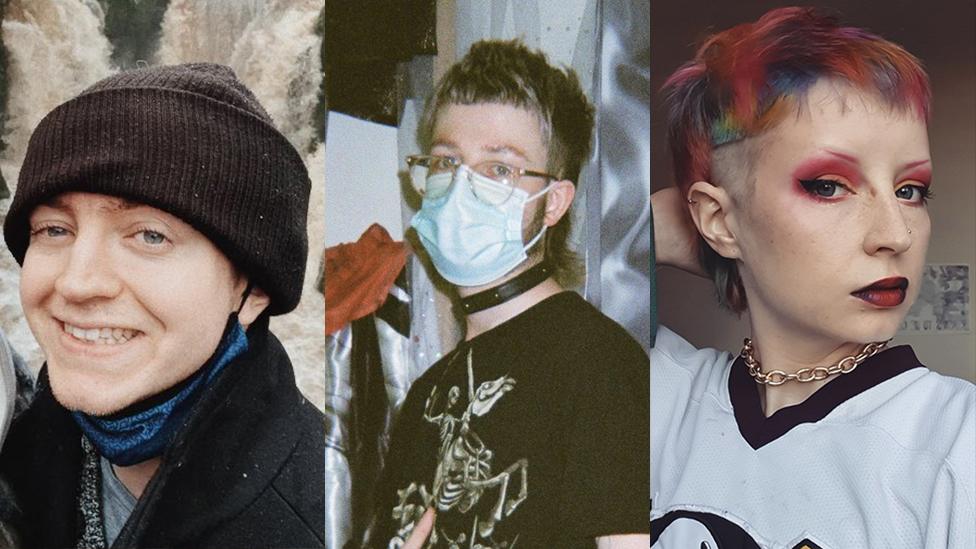
Spit Turner settles down to watch BBC Three's Drag Race UK every Thursday night with their mum.
But last week's episode was different. Drag queens Ginny Lemon and Bimini Bon Boulash had an open conversation about being non-binary.
"It was so cool. I was able to turn to my mum and say 'Oh, that's how I identify'," Spit tells Radio 1 Newsbeat.
It's the first time the 22-year-old properly opened up to their mum about their feelings toward their gender.
Non-binary is a term used to describe people who don't identify as male or female. Often, non-binary people will use they/them in place of gendered pronouns.
The programme aired a conversation where Ginny Lemon speaks about never feeling "comfortable" in their body, and being labelled "an outsider".
"I've never had the support. I grew up in a very working class council house, anybody who was any different from the binary was a freak," Ginny said.
Allow X content?
This article contains content provided by X. We ask for your permission before anything is loaded, as they may be using cookies and other technologies. You may want to read X’s cookie policy, external and privacy policy, external before accepting. To view this content choose ‘accept and continue’.

Allow X content?
This article contains content provided by X. We ask for your permission before anything is loaded, as they may be using cookies and other technologies. You may want to read X’s cookie policy, external and privacy policy, external before accepting. To view this content choose ‘accept and continue’.

Spit had "jokingly" come out as non-binary before, but hearing Ginny speak on the programme was the first time they seriously told their mum how they feel about gender.
"My mum's an older Catholic Irish woman, being non binary isn't really something that she would know.
"So having someone on TV talk about it in a way that's so accessible, it was so easy. She was like 'Oh, OK cool'."
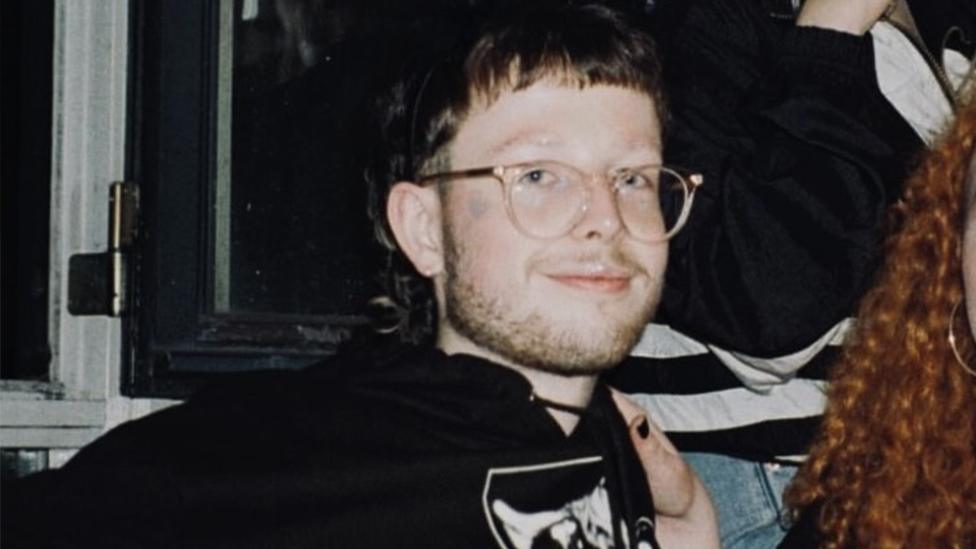
Spit says they're very lucky to have "accepting, loving parents" but they still related to Ginny's experience growing up.
"I was in a working class area too, and I actually went to an all boys Catholic school. You really couldn't express yourself."
Spit was watching Drag Race growing up and says they kept "a lot of it in secret".
Now with the show's huge audience, they hope representation will make it easier for other non-binary people coming out in future.
"When I tell people, they react in a way as if it's embarrassing.
"I think it's because they've never known someone like that on TV or in their life. When they don't understand it they lash out."
That's what Jamie Schofield is worried about.
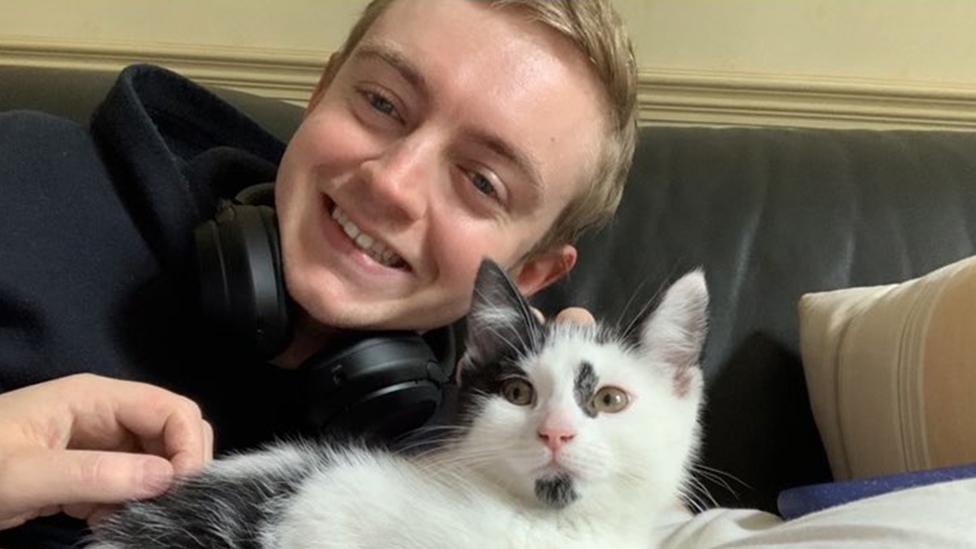
The 26-year-old has told close friends that they identify as non-binary, but not family.
"My absolute worst nightmare is coming out and them being like, 'What? I don't know what that is'."
That's why Jamie found the conversation on last night's Drag Race UK episode so moving.
"I was taken aback when it happened. It's the first time I've ever felt: 'That's like me'."
Jamie was surprised to hear that the drag queens had had issues around identity.
"I had thought, there's no way they could ever be lacking in self confidence or anything, because they just look incredible and they're the most fun people."
'What I needed growing up'
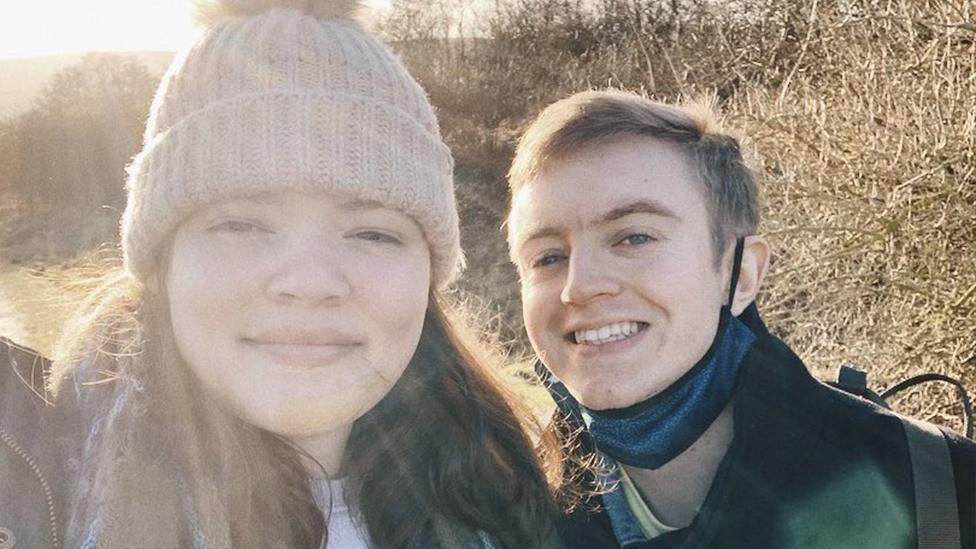
Jamie with their partner
Jamie agrees with Spit, that honest conversations about gender on programmes like Drag Race will make a huge difference.
"I went to all boys private school, and it was just this culture of toxic masculinity. It was horrible.
"Shows like Drag Race being able to give put this information out there is so nice to watch. The conversation was so shocking to me, it was so real.
"It's what I needed when I was growing up."
'Super exciting'
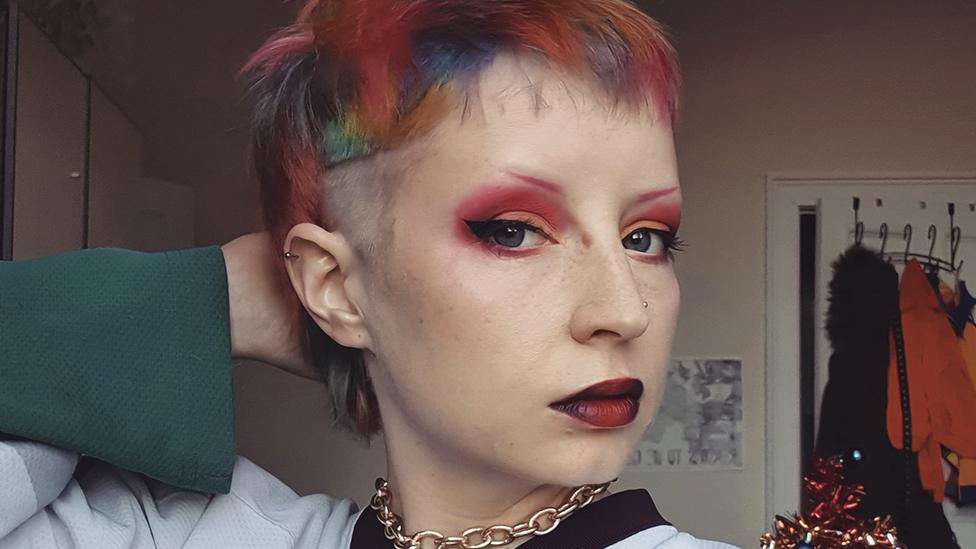
Aislinn Draws says what was so special about Ginny and Binimi's conversation was that they were on the "same level".
"I fully cried at it. Having two non-binary people having a conversation, instead of it being a non-binary person explaining themselves to someone else.
The 30-year-old said they felt it was "for" non-binary people, rather than being "about" them.
They hope it makes younger viewers, who might be questioning their gender, "feel less weird".
"It's all much more accessible, I'm glad that it's happening now."
Aislinn wants people to know that the non-binary community "aren't trying to change anyone".
"All we want to do is be ourselves. You don't have to understand it.
"I don't understand Japanese, but I'm not out here claiming that it doesn't exist.
"People just need to be able to have open conversations and talk and that's why I think yesterday's moment was so important."
'Notions of gender hold people back'
After a huge outpouring of support on social media following the episode, both Ginny and Bimini spoke more about their non-binary experience and how viewers reacted.
"I never thought about the impact that conversation with Sister and Bimini would have and I'm flabbergasted by the reaction," Ginny tweeted., external
"Seeing myself on the screen like that was so raw and I'm still processing."
"In these most peculiar of times we can all seek solstice in knowing that we are all on that journey to loving oneself. Ourselves. Yourself. Especially to my non-binary trans siblings or anyone who has felt like an outsider."
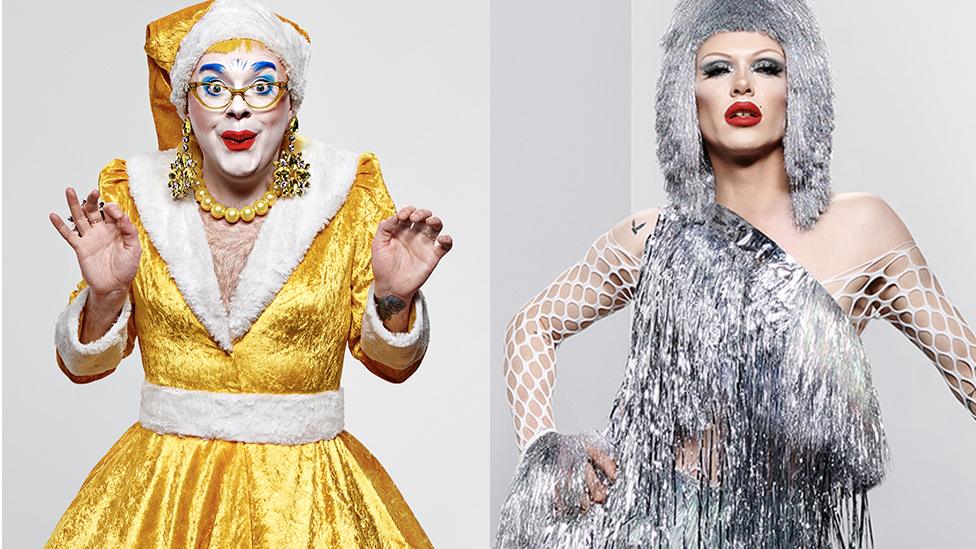
Both Ginny and Bimini identify as non-binary, and spoken about this on Drag Race
Bimini said that as a child they gravitated towards "things society deems as 'feminine'."
"As I grew up, my interest in what the other boys were doing was almost non-existent. I started becoming a lot more self-aware of my surroundings and what I had to do to 'fit in'," they wrote.
"My view is that societies preconceived notions of gender hold many people back, whether that is men, women or a person that views themselves as more gender fluid.
"A young girl should never be prevented from wearing a football shirt and playing in mud if she wants. A young boy should never be humiliated for wanting to wear a dress or play with a doll."


Follow Newsbeat on Instagram, external, Facebook, external, Twitter, external and YouTube, external.
Listen to Newsbeat live at 12:45 and 17:45 weekdays - or listen back here.
- Published14 January 2021
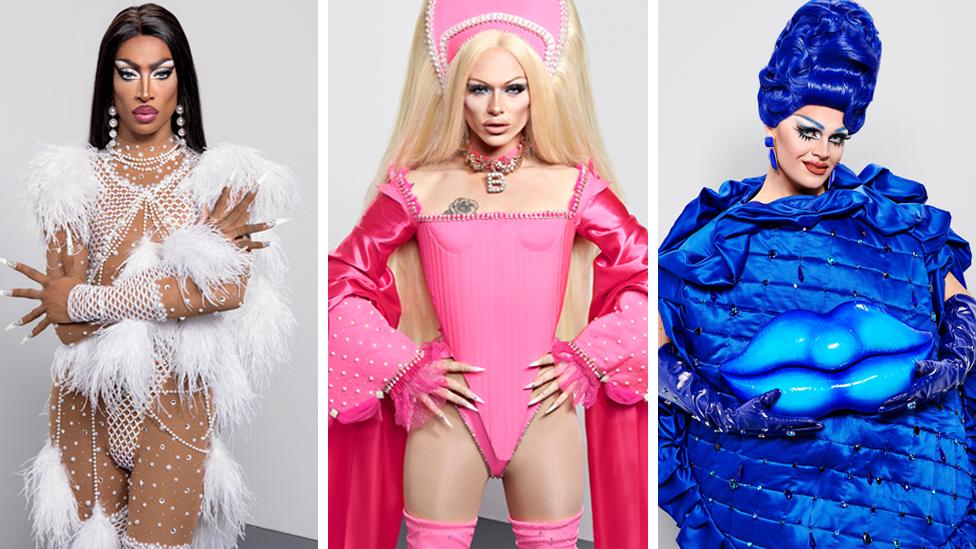
- Published22 September 2019
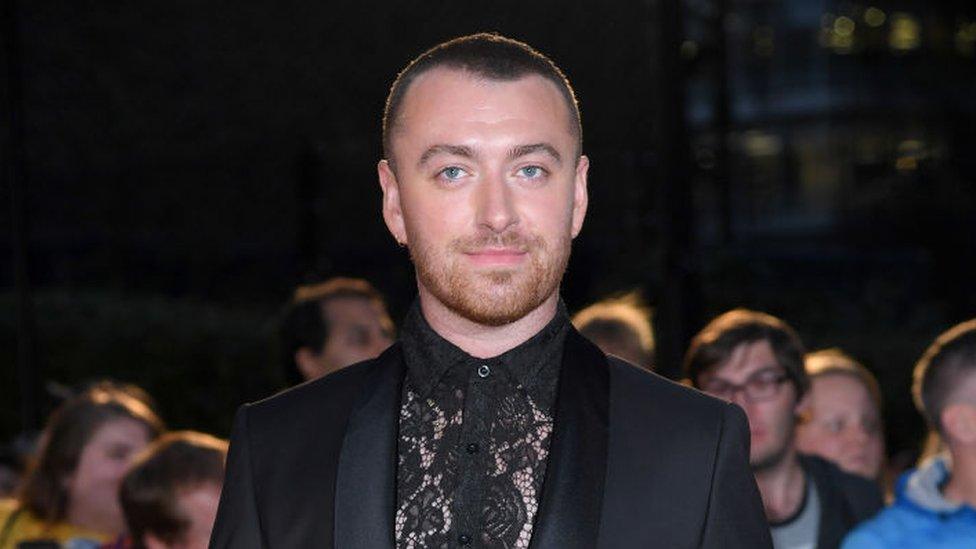
- Published29 May 2020
